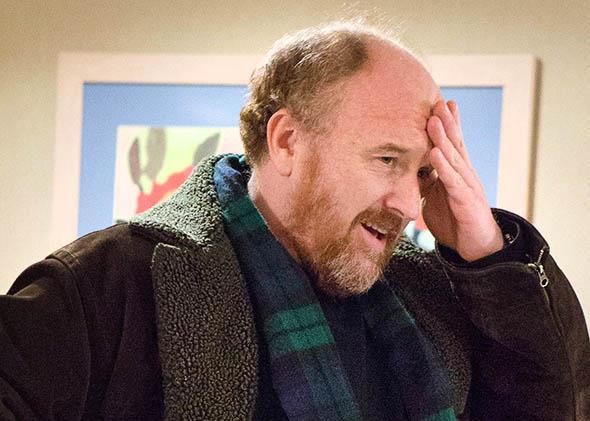Some spoilers for the Louie Season 5 premiere below.
“I’m a boring asshole now, that’s what I am.” These are some of the first words we hear in “Potluck,” the premiere of Louie’s fifth season. The statement is presented as revelation: Louie’s frank self-appraisal in front of his sleeping psychiatrist. But it’s old news to the audience. For five years now, Louis C.K.’s TV alter ego has been the best, most watchable sad sack around. He is not an antihero, or any kind of hero; he’s just a middle-age single guy with two daughters, a weakness for ice cream, and a perpetual sense of crisis.
The initial takeaway from tonight’s premiere is that the show is something it hasn’t been for awhile: an absurdist comedy that makes actual, laugh-out-loud jokes. Louie’s previous season was its darkest, transforming the half-hour show into a glorious, extended exercise in art-house cinema. There were spurts of comedy, but the plot took brooding detours, exploring our protagonist’s inner turmoil through multiple-episode arcs. When we last saw Louie, he was butt-naked, crouched in an overflowing tub with on-and-off-again flame Pamela.
In “Potluck,” Pamela is nowhere in sight, and the surreal, sui generis humor of the show’s early seasons is back. Some choice snippets: Louie makes an awkward, accidental appearance at a New Age cabal’s dinner party; Louie shows up at a parent potluck with a plate of KFC swaddled in aluminum foil; Louie tells one of the parents, with a delightful air of detachment, that his daughter is “better than you.” For most of the episode, C.K.’s philosopher-king impulses are absent; the jester has the court.
These light, raucous moments are welcome, but C.K.’s other side, the one constantly toying with our expectations, still lurks in the shadows. Compared with the episodes that follow, “Potluck” is an outlier. It seems to prefigure a humdrum season of more conventional, gag-based humor, but beneath its self-contained farce the episode actually complicates C.K.’s pet themes in small, potent ways. And it’s ultimately a perfect setup for the story arc that follows in the next few episodes.
In the episode’s concluding sequence of events, Louie helps Julianna, the lesbian potluck host’s pregnant surrogate, up to her apartment. As he prepares to leave, she breaks down in tears, prompting one of the long, rambling, self-conscious speeches about attraction that Louie tends to give to any woman who offers him attention.
“I don’t want to intrude,” he begins, “… but you’re like a classical painting of a life-goddess … erotic and gorgeous and cute and lovely … so congratulations on that.” Julianna then embraces him, turns around, lifts up her dress, and demands that they have sex. Louie bumbles up behind her, and the two share a few seconds of joy until her water breaks midcoitus.
It’s a hilarious set piece, and the latest iteration of Louie’s primary motif: the punctured male fantasy. Before Julianna, there was a voyeuristic bookstore clerk, a cancer-ridden bookstore clerk, a supermodel Louie accidentally knocks out, and a date, brilliantly played by Melissa Leo, who rapes him in a car. The situation is always the same: These women aggressively voice their desires to Louie, and he, helpless or naive or both, bungles the encounter. Time and again, his interactions with females hew to a cycle of tension, release, and ridicule, and the joke is always on him.
The pregnant sex scene follows that cycle: Louie’s ham-fisted exertions are hilarious, but, as usual, his utter irrelevance is the real punch line. (His way of marginalizing himself as a comedic tact is nicely highlighted in the scene’s aftermath, when the newborn’s parents arrive at the hospital and promptly tell Louie to screw off.) On the whole, the premiere sets a lighter mood than we’re used to; it lets us wonder whether Pamela Adlon is gone from the show’s forefront, her plotline another casualty of Louie’s surreal and comic rejection of continuity. But in the next episode, she returns, the pregnant woman is forgotten, and the emotional stakes ratchet up again. The show becomes much more somber, digging deeper than ever into the themes of masculinity and emasculation that we’ve come to expect from its creator. And this early bait-and-switch—the bizarre, goofy sex scene pivoting into a kind of dark relationship realism—is a canny juxtaposition that makes the Pamela arc seem even more stark and sad.
